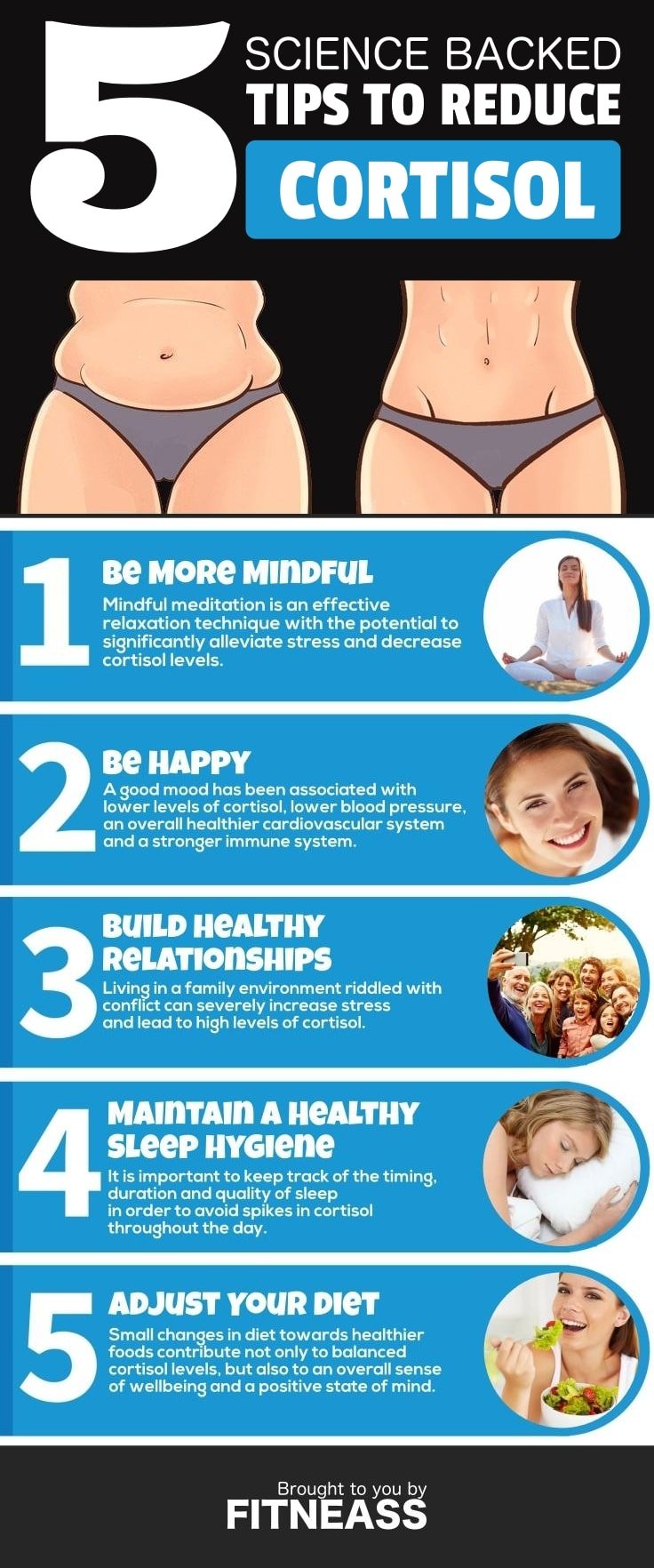5 Effective Ways To Reduce Cortisol, Backed By Science

Elevated cortisol can cause increased body fat and lowered testosterone. Learn how to reduce cortisol with these scientific tips.
Classified as a steroid hormone, cortisol is secreted by the adrenal glands into the bloodstream to be transported throughout the body.
Cortisol is widely associated with stress and its effects can wreak havoc on the body.
In fact, these are two key reasons why top athletes work hard to reduce cortisol production:
- Needless to say, lower cortisol can help optimize testosterone;
- And decrease body fat.
Nonetheless, cortisol actually fulfills a plethora of functions, including:
- Regulation of metabolism;
- Reducing inflammation;
- Assisting in memory formation;
- Lowering or heightening blood pressure;
- Promoting the growth of the fetus.
Almost every cell in our body contains receptors sensitive to cortisol, which gives us a convincing glimpse into its vital importance for overall health.
The issues with cortisol, like with most hormones and chemical substances, appear when there is too much of it in the bloodstream.
As part of the fight or flight defensive mechanism, the adrenal glands release additional cortisol in response to stress or fear, thereby preparing the body for increased physical effort.
However, this is a biological reaction that dates back to our primeval ancestors, when situations of stress were actually life-threatening and quite physically demanding.
In a sedentary, digital world, our body no longer needs a physical release of strength or endurance to survive – in most cases, at least.
Cortisol continues to be secreted as a result of stress, but because it is no longer used up, it remains in the bloodstream and causes significant damage over time.
The effects of increased levels of cortisol over extended periods of time include:
- Weakened immune system and a predisposition to infections;
- Predisposition for chronic complications, such as high blood pressure or type 2 diabetes;
- Difficulties in managing or losing weight;
- Fatigue, which sets in as a result of poor sleep patterns;
- The sensation of mental cloudiness, resulting from the impact of cortisol on memory;
- Decreased testosterone.
How To To Reduce Cortisol
Here are the key factors that might help you easily reduce cortisol level:
1. Become More Mindful
The practice of mindfulness meditation can help decrease cortisol in at least two ways.
On the one hand, mindful observation can help you recognize those thoughts or thought patterns that provoke stress, thereby giving you the possibility to curb their influence on your state of mind and behavior.
According to a vast number of studies, mindful meditation is an effective relaxation technique with the potential to significantly alleviate stress and decrease cortisol levels. (1)
Deep breathing exercises, yoga and listening to music have also been demonstrated to reduce cortisol. (2,3,4)
2. Be Happy
A good mood has been associated with lower levels of cortisol, lower blood pressure, an overall healthier cardiovascular system and a stronger immune system throughout several studies. (5)
Even something as simple as laughter was shown to immediately reduce cortisol. (6)
Furthermore, while experiencing shame, guilt or low self-efficacy can lead to elevated cortisol, activities that increase life satisfaction, as well as indoor or outdoor hobbies, have the reverse effect. (7)
3. Build Healthy Relationships
Living in a family environment riddled with conflict can severely increase stress and lead to high levels of cortisol, especially in the case of children.
Similarly, couples experience elevated cortisol as a result of a conflict but might lower its impact through non-judgmental mindfulness and an empathic attitude. (8)
On the other hand, loved ones offering their support can help reduce cortisol in a person faced with a stressful situation. (9)
Pet ownership and interaction with a pet can also display a comparable effect. (10)
4. Maintain A Healthy Sleep Hygiene
It is important to keep track of the timing, duration and quality of sleep in order to avoid spikes in cortisol throughout the day.
One study showed, for example, that cortisol is higher in people who sleep during the day, rather than during the night.
Another study confirmed that overall sleep deprivation causes increased levels of the hormone over time. (11)
Even the briefest interruptions of sleep can disrupt the normal secretion of hormones throughout the following day, which is why it is essential to design an appropriate sleeping environment, away from distractions and potential disturbers.
5. Adjust Your Diet
What you eat has a tremendous impact on your levels of cortisol. Most notoriously, sugar intake can trigger cortisol release and maintain high levels of the hormone over significant time spans. (12)
At the other end of the spectrum, healthy foods such as most fruits or dark chocolate were shown to reduce cortisol. So were black or green tea and probiotics found in yogurt and kimchi. (13)
Small changes in diet towards healthier foods contribute not only to balanced cortisol levels, but also to an overall sense of wellbeing and a positive state of mind.
Bonus: Supplements That Reduce Cortisol
In addition to the lifestyle changes described above, cortisol may be kept in check with the help of certain supplements.
Studies have shown, for example, that fish oil, which is one of the richest sources of omega-3 fatty acids, can reduce cortisol in individuals faced with a stressful event or task. (14)
Ashwagandha, an Asian herb used in traditional medicine in order to ameliorate stress, was also demonstrated to lower cortisol levels when taken as a dietary supplement. (15)
Nevertheless, whether you choose to manage your cortisol with dietary supplements or otherwise, it is essential to remember that this is a hormone thoroughly affected by your state of mind, as well as your emotional state.
To allow it to fulfil its roles in the body without becoming troublesome, a mindful, positive attitude is perhaps your most powerful tool.






